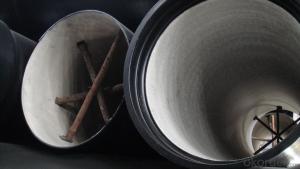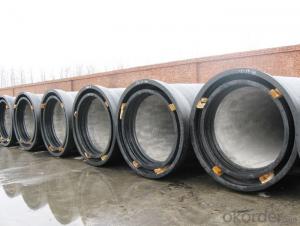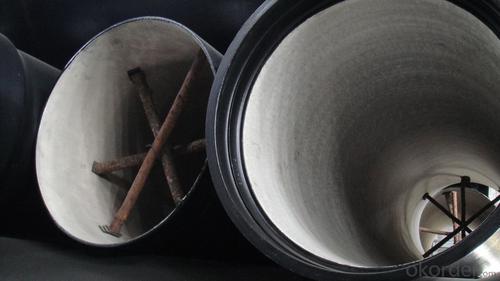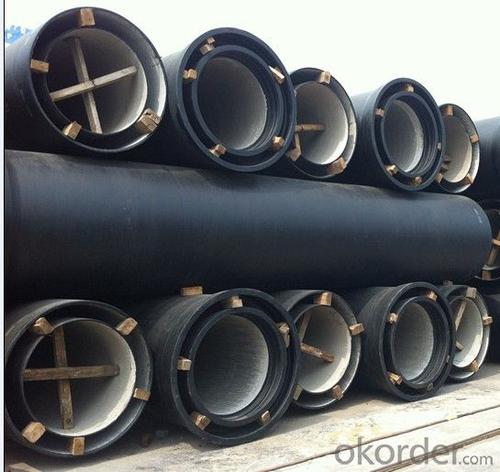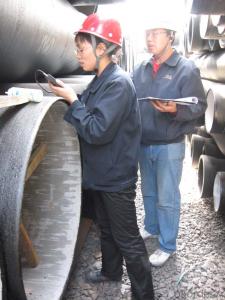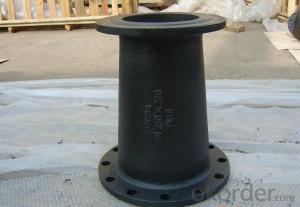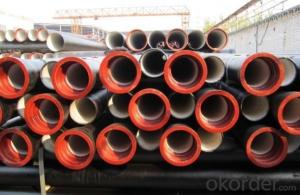Ductile Iron Pipe On Sale Made In China DN300
- Loading Port:
- Tianjin
- Payment Terms:
- TT OR LC
- Min Order Qty:
- 1000 m
- Supply Capability:
- 10000 m/month
OKorder Service Pledge
OKorder Financial Service
You Might Also Like
1.Packaging & Delivery
Packaging Detail: | DN80-300 bundled with steel belt ( the bundle size see the product detail part) DN400-1200 are in bulk |
Delivery Detail: | at least 5days for MOQ |
2.Specifications
Ductile iron pipe comply with ISO2531/EN545
1)We are factory
2)Best quality
3)Competive price
4)On time delivery
3.Features:
Facilitating high resistance to loadings, pressure and vacuum with high tensile strength,
Enabling high resistance to corrosion,
Not requiring cathodic protection,
Less operating cost since cast pipes have larger nominal diameter than polyethylene pipes.
Being the best pipe in case of an earthquake, with its ability of resilience and resistance to impacts without deformation,
Long product life, exceeding 50 years,
Preserving the quality of water with healthy interior coating.
4.Applied Standards:
General Design | ISO 2531 |
Internal Lining | ISO 4179 |
External Coating | ISO 8179 |
Polyethylene Coating (Optional) | ISO 8180 |
5.Joint Types:
Push-on Type | TYT Type |
Standard Type |
6. Diameters:
Pipes | Ø80 – Ø1200 mm (L = 6m, and 5.7m) |
Fittings | Ø80 - Ø2200 mm |
7. Wall Thickness:
Pipes | C and K classes |
Fittings | Class K10 - K12 |
8.Test Pressures:
Pipes | for Ø80 - Ø300 mm | 50 bar / 40 bar |
for Ø350 - Ø600 mm | 40 bar / 30 bar | |
for Ø700 - Ø1000 mm | 32 bar / 25 bar | |
for Ø1100 - Ø2600 mm | 25 bar |
Fittings | for Ø40 - Ø300 mm | 25 bar (*) |
for Ø350 - Ø600 mm | 16 bar | |
for Ø700 - Ø2600 mm | 10 bar | |
(*16 bar for fittings with PN10 flanges) | ||
9.Materials:
Pipe | Ductile iron casting, minimum 420 MPa tensile strength |
Internal Lining | Concrete Lining, ISO 4179 |
Socket Internal 10.Lining | 200 micron epoxy coating |
External Coating | 70 micron bitumen coating on 130 gr/m2 zinc coating, ISO 8179 |
Fittings | Ductile iron casting, minimum 420 MPa tensile strength |
Internal Lining | Concrete Lining, ISO 4179 |
External Coating | 70 micron bitumen coating on 130 gr/m2 zinc coating, ISO 8179 |
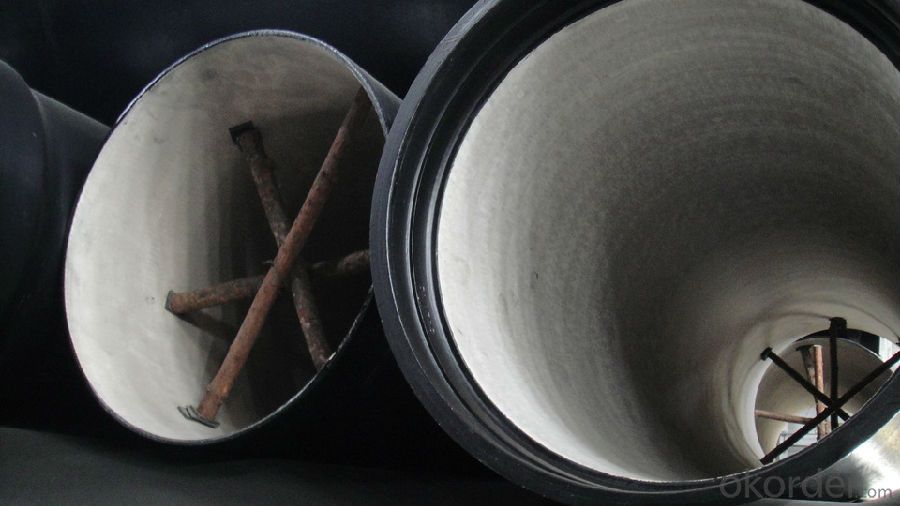
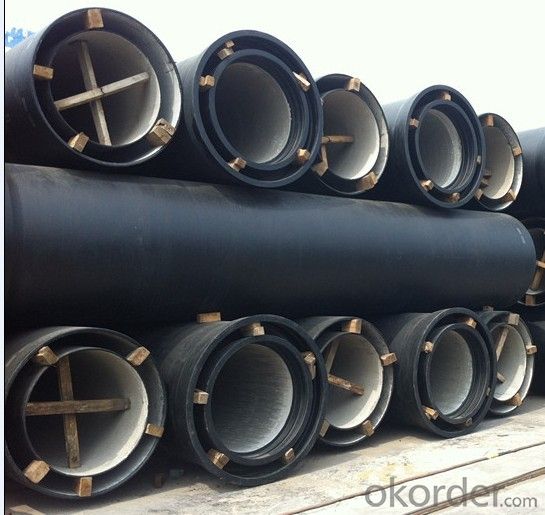
- Q: What is the difference between ductile iron pipes and cast iron pipes?
- Ductile iron pipes and cast iron pipes are both commonly used in various applications, but they differ in their composition, properties, and manufacturing processes. Composition: Ductile iron pipes are made from a type of cast iron known as ductile iron, which contains higher levels of carbon, silicon, and other alloying elements like magnesium. On the other hand, cast iron pipes are made from regular cast iron, which has a higher carbon content and lower levels of alloying elements. Properties: Ductile iron pipes are known for their high tensile strength, flexibility, and durability. They can withstand higher pressure and have a greater resistance to impact, making them suitable for applications that require robust performance. In contrast, cast iron pipes are more brittle and fragile, which makes them prone to cracking or breaking under pressure or impact. Manufacturing process: Ductile iron pipes are created through a process called centrifugal casting, where molten ductile iron is poured into a spinning mold. This centrifugal force helps in distributing the molten metal evenly, resulting in a strong and uniform pipe. Cast iron pipes, on the other hand, are made using a process called sand casting, where molten cast iron is poured into a mold made of compacted sand. This method is less precise and can lead to variations in the final product. Applications: Due to their superior strength and flexibility, ductile iron pipes are commonly used in water and sewage systems, as well as in industrial pipelines that require high-pressure resistance. Cast iron pipes, on the other hand, are typically used in non-pressure applications like drainage systems or underground sewer lines. In summary, the main difference between ductile iron pipes and cast iron pipes lies in their composition, properties, manufacturing processes, and applications. Ductile iron pipes offer greater strength, flexibility, and durability, making them suitable for high-pressure applications, while cast iron pipes are more brittle and commonly used in non-pressure applications.
- Q: Are ductile iron pipes suitable for desalination plants?
- Yes, ductile iron pipes are suitable for desalination plants. Desalination plants typically require the transportation of large volumes of water, and ductile iron pipes offer several advantages that make them suitable for this purpose. Firstly, ductile iron pipes have excellent strength and durability, which is essential for withstanding the high pressure and corrosive nature of the desalinated water. They can handle the high flow rates and maintain structural integrity over long distances, ensuring a reliable and efficient water transport system. Additionally, ductile iron pipes have good resistance to corrosion, which is crucial in desalination plants where the water may contain high levels of salt and other minerals. The corrosion resistance properties of ductile iron pipes ensure that the water quality is not compromised and that the pipes have a long service life, reducing maintenance and replacement costs. Furthermore, ductile iron pipes have a high impact resistance, which is important in desalination plants where pipelines may be subjected to external forces or accidental damage. Their ability to withstand such impacts reduces the risk of leaks, ensuring the continuous and uninterrupted supply of water. Moreover, ductile iron pipes are also cost-effective compared to other pipe materials such as stainless steel or PVC. They have a lower initial cost and require less maintenance, making them a more economical choice for desalination plants. In conclusion, ductile iron pipes are indeed suitable for desalination plants due to their strength, durability, corrosion resistance, impact resistance, and cost-effectiveness. These pipes can effectively handle the demanding requirements of desalination plants, providing a reliable and efficient water transport system.
- Q: Deep well spiral iron pipe, or ductile iron tube?
- Ductile iron pipe is a kind of cast iron pipe. In quality, the spheroidization of cast iron pipes is controlled to be 1-3 (spheroidization rate 80%), so the mechanical properties of the cast iron pipes, ductile iron pipes and finished product libraries can be better improved, with the nature of iron and the properties of steel. Ductile cast iron pipe after annealing, the microstructure is ferrite and pearlite, good mechanical properties, excellent corrosion resistance, good ductility, good sealing effect, simple installation, mainly for municipal, industrial and mining enterprises, water supply, gas, oil etc..
- Q: Can ductile iron pipes be used in areas with high soil liquefaction potential?
- Ductile iron pipes can be used in areas with high soil liquefaction potential, but certain precautions and considerations need to be taken into account. Soil liquefaction is a phenomenon in which saturated soil temporarily loses its strength and behaves like a liquid during an earthquake or other seismic events. Ductile iron pipes are known for their strength, durability, and resistance to external loads, making them suitable for various applications, including water and wastewater transportation. However, when it comes to areas with high soil liquefaction potential, additional measures should be considered to ensure the pipes' performance and integrity. One crucial factor to consider is the pipe's installation depth. Ductile iron pipes should be installed at a sufficient depth below the ground surface to minimize the effects of soil liquefaction. The depth will vary depending on soil conditions and the level of seismic activity in the area. Consulting with geotechnical engineers and following local building codes and regulations is essential to determine the appropriate installation depth. Furthermore, proper backfill materials and compaction techniques must be employed during the pipe installation process. Using granular materials, such as crushed stone or gravel, for backfill can help improve the soil's stability and reduce the potential for liquefaction. Adequate compaction of the backfill is also necessary to ensure the pipes' stability and prevent settlement or movement during seismic events. Moreover, it is recommended to use flexible joints, such as restrained joints or push-on joints, when installing ductile iron pipes in areas prone to soil liquefaction. These joints allow for some movement and flexibility, which can help absorb the ground's movement during an earthquake, reducing the stress on the pipes and minimizing the risk of damage. Regular inspection and maintenance of the ductile iron pipes are crucial in high soil liquefaction potential areas. Monitoring for any signs of movement, settling, or damage should be conducted, and any necessary repairs or reinforcements should be promptly addressed to ensure the pipes' continued performance and safety. In conclusion, ductile iron pipes can be used in areas with high soil liquefaction potential, but careful consideration of installation depth, proper backfill materials and compaction, the use of flexible joints, and regular maintenance are crucial to ensuring their optimal performance and longevity. Consulting with geotechnical engineers and following local building codes and regulations is highly recommended to ensure the pipes' suitability in such areas.
- Q: How are ductile iron pipes protected against root intrusion?
- Ductile iron pipes are protected against root intrusion through various methods and techniques. One commonly used approach is the application of root inhibitors or growth regulators. These chemicals are typically injected into the soil around the pipes, creating a barrier that inhibits root growth near the pipe. This helps prevent roots from penetrating the pipe and causing damage. Another method involves the use of physical barriers such as root barriers or sleeves. These are installed around the pipes to physically block the roots from accessing them. Root barriers are typically made of materials like plastic or metal and are designed to withstand the pressure exerted by growing roots. Additionally, regular maintenance practices such as periodic inspections and cleaning are essential in preventing root intrusion. By monitoring the condition of the pipes and removing any existing root masses, the risk of further root intrusion can be minimized. It is worth noting that preventative measures are more effective than reactive measures when it comes to protecting ductile iron pipes against root intrusion. Therefore, implementing proactive strategies during the installation phase, such as proper pipe bedding and alignment, can help reduce the likelihood of root intrusion in the first place. Overall, a combination of chemical treatments, physical barriers, and appropriate maintenance practices can significantly enhance the protection of ductile iron pipes against root intrusion, ensuring their long-term durability and functionality.
- Q: What are the different corrosion protection options for ductile iron pipe?
- There are several corrosion protection options available for ductile iron pipe to ensure its longevity and durability. These options include: 1. Cement Mortar Lining: This involves coating the inner surface of the pipe with a layer of cement mortar, which acts as a barrier between the pipe and corrosive elements in the water or soil. Cement mortar lining provides excellent corrosion resistance and can last for several decades. 2. Polyethylene Encasement: This method involves wrapping the ductile iron pipe with a layer of polyethylene material. The polyethylene acts as a physical barrier, protecting the pipe from external corrosive elements. Polyethylene encasement is commonly used in aggressive soil conditions and can offer long-lasting protection. 3. Internal and External Coatings: Various types of coatings can be applied to the inner and outer surfaces of the ductile iron pipe to provide corrosion resistance. These coatings can be epoxy, polyurethane, or fusion-bonded epoxy (FBE) coatings. These coatings create a barrier between the pipe and the surrounding environment, preventing corrosion. 4. Cathodic Protection: This method involves using an electrical current to protect the pipe from corrosion. Cathodic protection systems can be either galvanic (sacrificial anode) or impressed current systems. These systems direct the flow of electrons to prevent the oxidation of the ductile iron pipe. 5. Zinc Coating: Zinc coating, also known as galvanizing, involves applying a layer of zinc to the surface of the ductile iron pipe. The zinc acts as a sacrificial anode, corroding instead of the iron pipe. Zinc coating provides effective corrosion protection, particularly in soil conditions with low resistivity. It's important to note that the choice of corrosion protection option for ductile iron pipes depends on various factors such as the environment, water chemistry, soil conditions, and expected service life. Consulting with corrosion protection specialists and engineers can help in selecting the most suitable option for specific applications.
- Q: Can ductile iron pipes be used in areas with high soil erosion?
- Ductile iron pipes, due to their inherent strength and durability, can be used in areas with high soil erosion. Ductile iron is a type of iron that has been treated with graphite nodules, which enhances its flexibility and tensile strength. This makes it highly resistant to cracking and breaking, even under extreme conditions. In areas with high soil erosion, the ground is prone to shifting and movement, which can put significant stress on underground pipes. However, ductile iron pipes have a high resistance to external loading and can withstand the pressures exerted by the surrounding soil. They have been extensively tested and proven to be reliable in such environments. Furthermore, ductile iron pipes have a long lifespan, often exceeding 100 years, which makes them a cost-effective choice for areas with high soil erosion. Their corrosion resistance and structural integrity make them suitable for installation in various soil conditions, including those prone to erosion. It is important to note that proper installation techniques, such as using suitable bedding and backfill materials, should be followed to ensure the optimal performance of ductile iron pipes in areas with high soil erosion. Additionally, regular inspection and maintenance should be conducted to identify any potential issues early on and prevent any damage caused by soil erosion. Overall, ductile iron pipes are a reliable and durable option for areas with high soil erosion, providing long-lasting and efficient water distribution and wastewater management systems.
- Q: Can ductile iron pipes be used for underground river crossings?
- Yes, ductile iron pipes can be used for underground river crossings. Ductile iron pipes are known for their strength and durability, making them suitable for various applications including underground river crossings. These pipes have a high tensile strength and can withstand the external loads and pressures exerted by the surrounding soil and water. Additionally, they have excellent corrosion resistance, which is crucial when dealing with underground water sources like rivers. Ductile iron pipes are also capable of withstanding ground movements, settling, and other geological challenges that may occur during the installation and operation of underground river crossings. Therefore, they are a reliable choice for ensuring the safe and efficient transportation of water across rivers while maintaining the integrity of the underground infrastructure.
- Q: Can ductile iron pipes be used in areas with high levels of heavy metal contamination?
- Areas with high levels of heavy metal contamination can indeed utilize ductile iron pipes. Ductile iron, known for its strength and durability, is resistant to corrosion, thus making it ideal for various environmental conditions, including those with heavy metal contamination. The structural integrity and performance of ductile iron pipes remain unaffected by the presence of high levels of heavy metals in the surrounding soil or water. These pipes feature a protective lining, typically made of cement mortar or polyethylene, which acts as a barrier between the pipe and its environment. This lining effectively prevents the leaching of heavy metals into the flowing water. Moreover, ductile iron pipes have demonstrated exceptional resistance to chemical corrosion, including that caused by heavy metals. Consequently, they have been extensively used in industrial settings where heavy metal contamination is prevalent, such as wastewater treatment plants, industrial facilities, and mining sites. However, it is crucial to emphasize the importance of regular monitoring and maintenance for ductile iron pipes, even though they can withstand high levels of heavy metal contamination. These measures ensure that the protective lining remains intact and any potential issues are promptly addressed. In conclusion, ductile iron pipes are a suitable choice for areas with substantial heavy metal contamination. Their strength, durability, and resistance to corrosion make them a reliable option for transporting water and other fluids, even in challenging environments.
- Q: How can the ductile iron pipe be welded?
- The nickel electrode cold welding, such as Z408
Send your message to us
Ductile Iron Pipe On Sale Made In China DN300
- Loading Port:
- Tianjin
- Payment Terms:
- TT OR LC
- Min Order Qty:
- 1000 m
- Supply Capability:
- 10000 m/month
OKorder Service Pledge
OKorder Financial Service
Similar products
Hot products
Hot Searches
Related keywords
